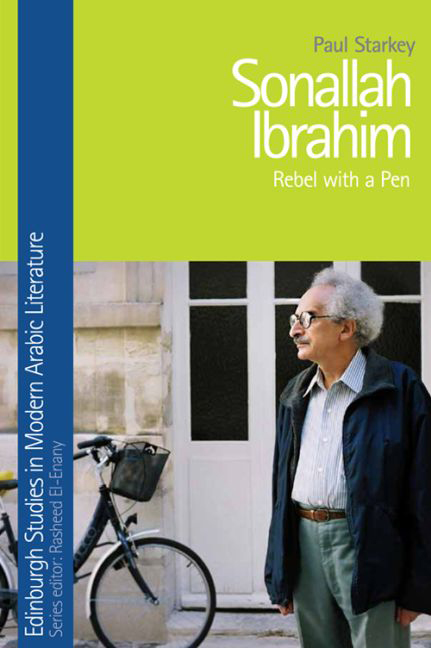Book contents
- Frontmatter
- Contents
- Series Editor's Foreword
- Preface
- 1 Introduction: Background and Context
- 2 Rebel with a Pen
- 3 Cairo Prison: Tilka al-raʾiha (1966)
- 4 Michelangelo and the Dam: Najmat Aghustus (1974)
- 5 CocaColaland: al-Lajna (1981)
- 6 War in Lebanon: Bayrut, Bayrut (1984)
- 7 Consumer Society: Dhat (1992)
- 8 Prison of Dishonour: Sharaf (1997)
- 9 Widening Horizons (1): Sex, Memory and Revolution: Warda (2000)
- 10 Widening Horizons (2): In the Land of the Capitalists: Amrikanli (Amri Kan Li) (2003)
- 11 Return to Childhood: al-Talassus (2007)
- 12 The French Connection: al-ʿImama wa-al-Qubbaʿa (2008) and al-Qanun al-Faransi (2008)
- 13 Filling a Gap: al-Jalid (2011)
- 14 Epilogue
- Bibliography
- Index
7 - Consumer Society: Dhat (1992)
Published online by Cambridge University Press: 23 September 2017
- Frontmatter
- Contents
- Series Editor's Foreword
- Preface
- 1 Introduction: Background and Context
- 2 Rebel with a Pen
- 3 Cairo Prison: Tilka al-raʾiha (1966)
- 4 Michelangelo and the Dam: Najmat Aghustus (1974)
- 5 CocaColaland: al-Lajna (1981)
- 6 War in Lebanon: Bayrut, Bayrut (1984)
- 7 Consumer Society: Dhat (1992)
- 8 Prison of Dishonour: Sharaf (1997)
- 9 Widening Horizons (1): Sex, Memory and Revolution: Warda (2000)
- 10 Widening Horizons (2): In the Land of the Capitalists: Amrikanli (Amri Kan Li) (2003)
- 11 Return to Childhood: al-Talassus (2007)
- 12 The French Connection: al-ʿImama wa-al-Qubbaʿa (2008) and al-Qanun al-Faransi (2008)
- 13 Filling a Gap: al-Jalid (2011)
- 14 Epilogue
- Bibliography
- Index
Summary
After his brief foray into the wider Arab world in Bayrut, Bayrut, Sonallah Ibrahim's next novel, Dhat, published in 1992, returns to contemporary Egypt as the focal point of the narrative, picking up and developing a number of themes already evident in the author's earlier novels.
Publication and Translations
The novel was first published in Cairo by Dar al-Mustaqbal al-ʿArabi in 1992, and has been reprinted several times since. A French translation by Richard Jacquemond was published in 1993 as Les Années de Zeth, and an English translation by Tony Calderbank appeared in Cairo in 2001, published by the American University in Cairo Press under the title Zaat. The work was enthusiastically received and was nominated for the official novel prize due to be awarded at the Cairo International Book Fair in early 1993, but the nomination was withdrawn when it was pointed out that it would be incongruous for a state award to be awarded to a work that deliberately set out to subvert and discredit it.
Background
The political development of Egypt was arguably only briefly interrupted by the assassination of President Anwar Sadat in 1981. Although still held in favour by the West, Sadat had become progressively isolated domestically, as well as in the wider Arab world, most particularly because of his policies towards Israel; and in contrast to that of Nasser, his death was generally viewed with indifference by his fellow countrymen. Khalid al-Islambuli, the leader of the Islamist plot to kill Sadat, remained unrepentant to the end, and together with a number of other conspirators, was executed in April 1982.
Despite the dramatic nature of Sadat's demise, the transfer of power to his successor, Husni Mubarak, was a smooth one. Husni Mubarak had not been a member of the original Free Officers’ Movement and, despite having served as Vice-President under Sadat since 1975, was not well known to the Egyptian public. The initial impression he gave to his fellow countrymen was, however, a favourable one – his seemingly modest nature presenting a stark contrast to that of Sadat, who had begun to suffer from a growing megalomania in the final months of his rule, as he became increasingly out of touch with the real needs of the Egyptian population.
- Type
- Chapter
- Information
- Sonallah IbrahimRebel with a Pen, pp. 104 - 122Publisher: Edinburgh University PressPrint publication year: 2016



